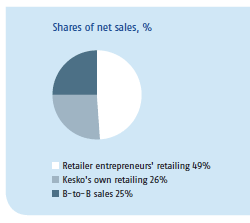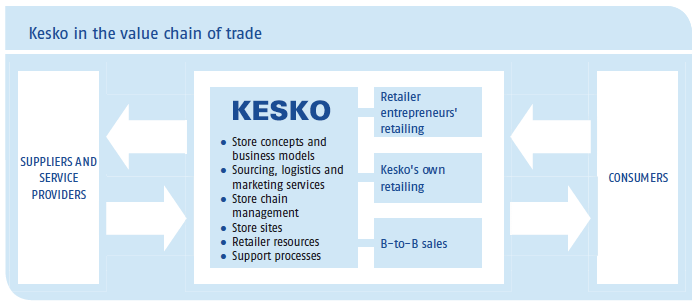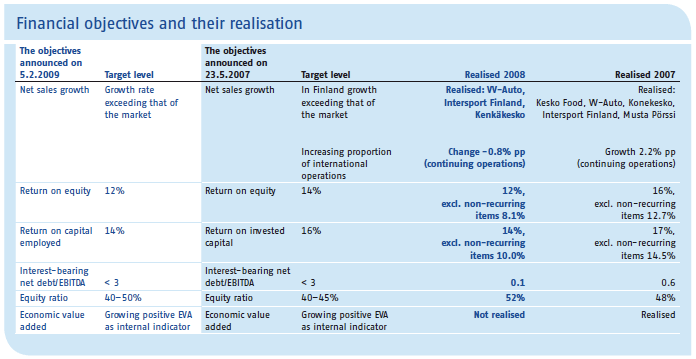Healthy, profitable growth
Objectives include a sales growth exceeding that of competitors and increasing the shareholder value
Kesko's key strategic objectives in all store chains include achieving a level of customer satisfaction and sales growth that exceeds the level achieved by competitors. The shareholder value is increased by long-term profit improvement. Objectives also include maintaining good financial standing and liquidity in all market conditions. The target return on equity is 12%, while the target return on capital employed is 14%.
Kesko implements a strategy of selective internationalisation
The objective is to invest in healthy,
profitable growth, while taking the market
situation and customer demand into
consideration.
Investments in the food trade are
directed at expanding and refurbishing
the store network in Finland. In addition,
expanding business to the Russian and
Baltic markets is studied.
In the building and home improvement
trade, the international network
will be expanded mainly in Russia in the
next few years. In addition to investments
in new store sites, business growth
may also be achieved through acquisitions.
The Russian market in particular is
considered to offer significant long-term
growth potential in the home building
and improvement trade. Support for
growth is provided by investments in the
joint enterprise resource planning system
and centrally directed logistics network
and by leveraging economies of scale in
sourcing and purchasing.
Sales and services to consumer-customers

Customer satisfaction exceeding that provided by competitors
The strategic emphasis lies on sales to
consumer-customers. The objective is to
achieve a level of customer satisfaction
and sales growth that exceeds the level
achieved by competitors. Success in the
consumer-customer trade requires clear
customer and brand promises and the
delivery of these promises at every visit
to the store. Customer promises are
delivered with high-quality and competitively-
priced products, a comprehensive
store network and good service.
Kesko has dozens of successful chain
and product brands. The extensive development
of brands and marketing, started
in summer 2007, continues. The objective
is to increase the value of Kesko's brands
and to improve the efficiency of marketing.
Focuses include the brand and marketing
strategies of various chains and
their implementation in stores. At the
chain level, this work has started with a
pilot project in the K-supermarket chain.
The lessons learnt in the project will be
used in the development of brands and
marketing throughout the organisation.
Creation of customer-driven selections
and targeted marketing are supported by
the K-Plussa customer loyalty system,
whose reward and payment card features
have undergone major reforms in recent years. The objective of the system is to
offer significant product and service benefits
to customers, encouraging them to
centralise their purchases in the K-Group.
Use of customer information has increased
considerably in key business areas. Chains
and stores leverage customer information,
for example, in their selection planning,
pricing and marketing.
Customer-driven business models
The business models applied in Kesko's sales to consumer-customers are retailing through retailer entrepreneurs and Kesko's own retailing. Kesko is also engaged in B-to-B sales.
1) Retailer entrepreneurs' retailing
The principal business model in the
Finnish market is the chain business
model, in which independent K-retailers
run retail stores in the chains managed
by Kesko. In Finland, for example, all
food and building and home improvement
stores in the K-Group are run by
retailer entrepreneurs. With its chain
operations, Kesko provides a first-class
setting for its retailer entrepreneurs to
serve their customers as well as possible.
The K-retailer entrepreneur is responsible
for his or her store's customer satisfaction,
personnel and profitability of business.
Good service and knowledge of
customers' needs provide the K-Group
with a competitive edge.
At the end of 2008, Kesko had 1,305
K-retailer entrepreneurs as partners and,
in addition, about 250 other retailer
partners in the Asko, Sotka, Byggmakker
and Senukai chains. Kesko's sales to
retailer partners accounted for 49% of
net sales in 2008.
2) Kesko's own retailing
Kesko acts as a retailer in business operations where the competitive advantage is based on the centrally managed chain concept. Kesko's own retail stores in Finland include the Anttila and Kodin Ykkönen department stores. In addition, Kesko is also responsible for retailing home and speciality goods in the K-citymarket chain. Kesko's own retailing is also the model mainly used in expanding business operations outside Finland. In 2008, Kesko's own retailing accounted for 26% of net sales.
3) B-to-B sales
Kesko is engaged in B-to-B sales in those business operations that support consumer-customer sales. Typical business customers include building companies, agricultural entrepreneurs, the manufacturing industry, institutional kitchens and the public sector. In 2008, Kesko's B-to-B sales accounted for 25% of net sales.
Electronic customer communications and e-commerce
The importance of electronic customer communications in trading has increased continuously. Kesko is developing online customer communications and the chains' online trading sites. The objective is to improve customer satisfaction and to increase sales. Kesko has gained a strong position in online sales of home and speciality goods through the NetAnttila and Kodin1.com concepts. In addition, Konebox.fi, an online store for home technology goods, was opened in autumn 2008 and the Budget Sport online store will open in spring 2009.
Responsible and cost-efficient business models
Sustainable development and responsible operating practices
The principles of sustainable development and responsible operating practices are a central part of Kesko's and its chains' daily activities. Consumer-customers require the trading sector to bear responsibility for products' safety and healthiness, and for the environmental and social impact of business operations. The results of responsible operations are reported annually in Kesko's Corporate Responsibility Report.
Efficient combination of retailer entrepreneurship and chain operations and leveraging economies of scale
The strategic objective is an efficient
combination of K-retailer entrepreneurship
and chain operations. K-retailers
are responsible for customer service, local selections and delivering the customer
promise in their stores.
Kesko's efficient chain operations and
joint processes provide support to retailers.
Chain operations offer the retailer a
joint business concept which includes,
among other things, chain control and
business management support related to
chain selection, pricing and marketing.
Joint chain operations carried out by
retailers and Kesko are further intensified
by developing increasingly better tools
and business models for the stores. The
most important of these are regional and
store-specific selections and pricing
guidance as well as tools for customer
relationship and store personnel management.
Kesko participates in international purchasing
cooperation in various product
lines, which increases purchasing volumes
and efficiency. The most important
partnership organisations in which Kesko
participates include AMS Sourcing B.V. in
the grocery trade, tooMax-x in the building
and home improvement trade, Intersport
International Corporation in the
sports trade and Electronic Partner International
in the home technology trade.
Work and productivity programme
Cost-efficient operations build price
competitiveness and customer satisfaction
in the retailing sector. They are also a basic requirement for increasing Kesko's
profitability and shareholder value.
The key objective of the work and productivity
programme launched is to
increase employees' work productivity in
Kesko and chain stores. The most important
tools for improving productivity
include increasing personnel competence
and the efficiency of operating practices.
Promoting the wellbeing of empoyees has
also become an increasingly important
factor. Retail stores also focus on enhancing
the productivity of store space and
capital.
Electronic and automated processes
A project to automate processes and routines
has been started with the purpose
of improving cost-efficiency. One area is
the shared service centre, K-talouspalvelukeskus
Oy, the duties of which include
determining uniform and efficient operating
practices for the Group's financial
management processes. The project to
replace paper invoices with electronic
ones will contribute to this automation.
The aim is to receive all suppliers' purchasing
invoices in electronic form starting
from 1 October 2009.
More detailed information about each
division's strategic emphases and
projects is provided in the division-specific
presentations starting from page 16.



